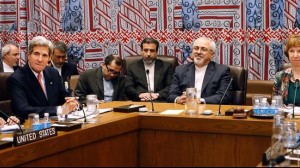 US Secretary of State John Kerry (left) and Iranian Foreign[/caption]
US Secretary of State John Kerry (left) and Iranian Foreign[/caption](Reuters) - The foreign ministers of the United States and Iran held rare private talks in Germany on Sunday to discuss the next stage in efforts to reach a definitive agreement to end a decade-old dispute over Iran's nuclear program.
U.S. Secretary of State John Kerry and Iranian Foreign Minister Mohammad Javad Zarif met on the sidelines of the Munich Security Conference to talk about nuclear negotiations between six world powers and Iran that will resume in Vienna on February 18.
The talks will aim to settle the nuclear dispute after�Iran�agreed, under a landmark preliminary deal last November, to halt its most sensitive nuclear operations in return for winning some relief from sanctions.
In his talks with Zarif, Kerry stressed the importance of both sides negotiating in good faith and�Iran�abiding by its commitments under the November interim accord, a U.S. State Department official said.
The United States and European Union suspended some sanctions on Iran under the interim deal, but Kerry made clear to Zarif that the United States will continue to enforce other sanctions.
There was no immediate comment from Iran on the talks.
Kerry and Zarif have met several times since Iranian President Hassan Rouhani, a relative moderate, was elected last June, leading to a thaw in ties with the West after years of confrontation and hostile rhetoric.
MCCAIN SAYS IRAN CHEATING
EU foreign policy chief Catherine Ashton, who coordinates the nuclear talks with Iran on behalf of the United States, Russia, China, Britain, France and Germany, welcomed the meeting between Kerry and Zarif.
"It is incredibly important that as the international community now looks to build towards the comprehensive talks, that the dialogue is taking place and that we're working out how to develop a comprehensive approach to this," she told reporters in Munich.
But Republican U.S. Senator John McCain sounded a cautious note, saying Iran had a long record of deception, and accusing Iran of cheating.
"Rouhani bragged to one of his media outlets how he had deceived the Americans and negotiators when he was a negotiator," he told the Munich conference.
"Construction continues around Arak (heavy water reactor), the centrifuges, 19,000 of them continue to spin, and most importantly implicit in this agreement is the right to enrich.
"There are three components to nuclear weapons - warhead, delivery system and the material itself. They are continuing and cheating on the first two without any constraint whatsoever," he said.
Zarif said in an interview on Saturday that Iran was not prepared to give up research on centrifuges used to purify uranium as part of a final nuclear deal.
Asked how long he thought it would take to reach a final agreement, Zarif said: "It's just the beginning of the negotiations for a final agreement. It is the first step of the final step and I expect it to take some time."
"We are ready because we believe it is in our interests and we have no other intention. So theoretically it shouldn't be that difficult. The detail may be a bit more difficult to achieve, so we will see," Zarif told Reuters and The International Media Associates, a television production company.
By Reuters
The Iran Project is not responsible for the content of quoted articles.










